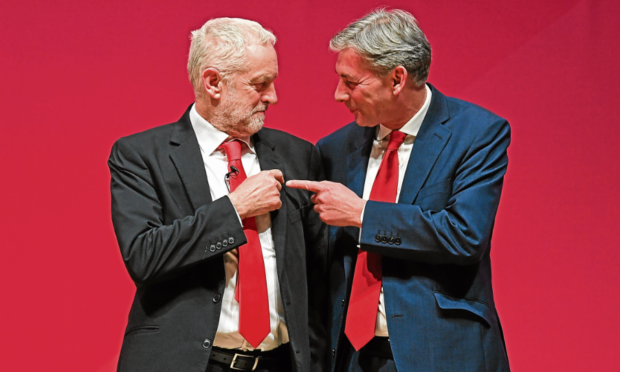Jeremy Corbyn has signalled that he could order a wide-ranging review of North Sea oil and gas taxes if he becomes the UK’s next prime minister.
The Labour leader said any changes would be focussed on boosting skills, jobs and investment.
Speaking to the Press and Journal at Scottish Labour’s spring conference in Dundee yesterday, Mr Corbyn also admitted that Britain had made a historic “mistake” made by failing to establish a multibillion pound, Norway-style oil wealth fund.
The North Sea sector was left reeling in 2011 when the coalition government at Westminster launched a surprise tax raid on producers, but businesses have since secured breaks for decommissioning and other investment.
Asked whether he would consider a tax review if he succeeds Theresa May as prime minister, Mr Corbyn said: “I would look very carefully at tax changes that make sure you don’t subsidise the destruction of the industry but instead that any tax changes are linked to training, are linked to investment, are linked to the development of new industries and research into high quality products and techniques for the future.”
Reflecting on the handling of the industry since the discovery of North Sea oil, he added: “I think we historically, particularly under Thatcher, North Sea oil revenues were used to underpin cuts in taxation and privatisation of large amounts of industry.
“What we suggest to any other country with large amount of highly profitable natural resources is create a sovereign wealth fund that’s there for the future and there for all time.
“Look at the success of the Norwegian sovereign wealth fund compared to ours – well it’s not very difficult is it?
“So I think it was a mistake there historically.
“There’s also an issue around the development of the industry and the decommissioning work that is necessary obviously now for decommissioning those rigs.
“But also developing and keeping those skill levels that are here in Dundee and in Aberdeen, and making sure that we do have a benefit in the long term for very high quality manufacturing industry jobs in both places.”
Mr Corbyn had earlier delivered an impassioned defence of his refusal to back continued membership of the European single market.
In his 25-minute keynote address to delegates, which was greeted with an extended standing ovation in the Caird Hall, he said such a move could not be considered at this stage because it may derail his plans for a “common sense revolution” at home.
The remarks were made amid a row over post-Brexit single market membership which threatened to overshadow the conference after the party leadership moved to shut down a vote on the issue.
Mr Corbyn, who recently called for a new customs union agreement with the EU after Brexit, said: “It would be wrong to sign up to a single market deal without agreement that our final relationship with the EU would be fully compatible with our radical plans to change Britain’s economy.
“We are determined to negotiate a deal that gives us full tariff-free access to the single market.
“But if we are genuinely going to have a jobs first Brexit, that deal must be compatible with our plans to bring the railways and postal service into full public ownership, transform energy markets and end the privatisation of our public services.
“And we also need to be clear, we could not accept a situation where we were subject to all EU rules and EU law, yet had no say in making those laws.
“That would leave us as mere rule-takers and isn’t a tenable position for a democracy.”
The Labour leader, who avoided any serious gaffes after an error-strewn run-up to the speech – including a misspelled conference reference to party founder Keir Hardie as “Keir Hardy” – also attacked UK ministers over their so-called devolution “power grab”.
He said: “The Tories have played right into the SNP’s hands in hoarding power for themselves in the back corridors of Westminster.
“The fact that the Scottish and UK governments are unable to reach agreement on the 24 areas of dispute that were revealed this morning highlights the utter chaos and mismanagement that is defining this Tory Brexit.”
